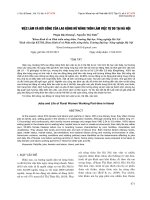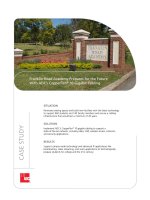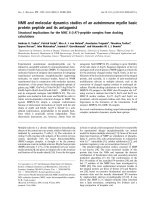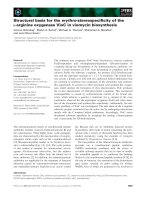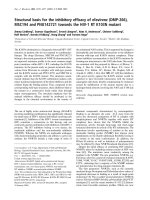Structural solution for the dike with slope type protected by soil stabilized block covered by polypropylene bag
Bạn đang xem bản rút gọn của tài liệu. Xem và tải ngay bản đầy đủ của tài liệu tại đây (724.36 KB, 4 trang )
HAPPY NEW YEAR 2018
STRUCTURAL SOLUTION FOR THE DIKE WITH SLOPE TYPE PROTECTED
BY SOIL STABILIZED BLOCK COVERED BY POLYPROPYLENE BAG
TRAN LONG GIANG1, NGUYEN THI DIEM CHI2
of Research and Development, Vietnam Maritime University
2.Faculty of Hydraulic Engineering, Vietnam Maritime University
1.Institute
Abstract
In Vietnam, amour stone, concrete, reinforced concrete and polypropylene bag have been
widely used in the construction of sea shore protection. The main reason causes erosion
of the coastal area is the wave and current. Thus, for sea shore protection, coastal
reinforced materials are resistant to erosion by seawater, wave load and current load. The
use of natural materials such as stone, heated materials such as cement and lime in
construction of dike often leads to high construction costs and environmental impact.
Facing this situation, the research of structural solution for the dike with slope type
protected by soil stabilized block covered by polypropylene bag is a completely new
direction, bringing both high economic efficiency and helping environmental protection.
Keywords: Shore protection construction work, soil stabilizer, wave load, current load.
Tóm tắt
Ở Việt Nam thường sử dụng các vật liệu gia cố bờ là đá đổ, bê tông, bê tông cốt thép và
bao địa kỹ thuật. Đối với gia cố bờ biển thì nguyên nhân gây xói lở mạnh nhất với bờ biển
là sóng, sau đó là dòng chảy. Các vật liệu gia cố bờ phải chịu được xâm thực và ăn mòn
của nước biển, tải trọng do sóng và dòng chảy. Việc sử dụng các loại vật liệu tự nhiên như
đá, các vật liệu nung như xi măng, vôi trong xây dựng công trình kè bờ thường làm cho chi
phí xây dựng cao và ảnh hưởng đến môi trường. Trước tình hình đó, việc nghiên cứu và
xây dựng kè chống xói lở bảo vệ bờ bằng các khối đất hóa cứng bọc vải địa kỹ thuật là một
hướng đi hoàn toàn mới, vừa mang lại hiệu quả kinh tế cao với chi phí xây dựng thấp, vừa
giải quyết được vấn đề về môi trường.
Từ khóa: Kè bảo vệ bờ, đất hóa cứng, tải trọng sóng, dòng chảy.
1. Introduction
Vietnam has a coastline of more than 3260 km which located in the monsoon zone, thus this
coastline often has influenced of typhoons. In recent years, strong typhoon combined with high tide
have caused serious damage for some beautiful sea shore areas. In order to exploit effectively
shorelines, the choice of the proper protected structure type plays a very important role.
Currently, the design and construction of dikes in Vietnam are mainly traditional structures that
using much materials such as bamboo, stone, concrete, reinforced concrete, steel,... However, these
structures are often unstable when constructed in weak soil areas and often requires local repairing.
Beside that the rearrangement of concrete blocks require the complex construction equipment and
handling techniques. The most common damage to traditional types is foot erosion, the roof sagging,
and deformation of whole structures. Some of the embankments were badly damaged during the
recent storms such as Cat Ba - Cat Hai embankments, Vu Long - Vu Binh and Vu Dong
embankments in Thai Binh Province, Ha Long embankment - in Quang Ninh Province that have
caused great damage to property, even unsafety for people. Therefore, in this paper, the authors
have studied and proposed solutions to build embankments to prevent erosion, protect the shoreline
by the new type of dike constructed from soil stabilized block covered by polypropylene bag.
2. The proposed solution for dike constructed by stabilized soil covered with geotextile bag
The use of local materials combined with chemical additives to harden the soil has been
implemented in transportation and irrigation works in some developed countries such as USA, UK,
Japan, Australia,... and in Vietnam the implementation of this application for new construction,
repairing of roads are applied quite a lot. However, this technology has not yet been applied to
irrigation works due to the concerns about decomposing materials in the sea water environment for
long-term work, and it is difficult to compact the soil without specialized compressing equipment.
In this paper, the authors present the solution using the soil stabilized block covered by
polypropylene bags that will be compressed when stacking together. In addition, new technologies
for soil hardening have been developed so that they can be used for many types of soil such as
lateritic, clay, sandy soils. Beside that the local chemical additive will help reduce the cost of building
26
Journal of Marine Science and Technology
No. 53 - January 2018
HAPPY NEW YEAR 2018
in comparison with using the imported additives such as DZ33 (United States), RRP (Germany),
Consolid (Switzerland), [2], [3],... the research and construction of embankments to prevent erosion
and protect the shoreline by the soil stabilized block covered by polypropylene bag is highly feasible.
Structural solutions for dike with stabilized soil cover by Polypropylene bag are based on the
following principle: local soil is mixed with chemical additive and enclosed by Polypropylene bag (Figure
1), the blocks are calculated and arranged so as to ensure local stability, general stability. Soil bags can
be stacked with common earth moving equipment such as excavators (Figure 2 and Figure 3).
Figure 1. Construction of soil mixed with
additives into Polypropylene bag
Figure 2. Using excavator to stack the stabilized
soil bag to build dike
Figure 3. Coastal embankments were constructed using Polypropylene bag filled with stabilized soil
The steps for calculating an embankment structure using stabilized soil and Polypropylene
bag are proposed as follows:
- Design of new material ingredient;
- Selection of geotextile type;
- Determining the size of the construction;
- Determining the load on the construction;
- Calculating the erosion resistance of the construction;
- Calculation of general stability of the dike;
- Calculation of local stability of soil stabilized block.
3. Application of new design for the dike in Tien Giang river bank
In this paper, authors have presented the design of construction of dike in Tien Giang province
using new structures in 2014. Figure 4 shows the erosion of the embankment due to the current and wave
caused by ships. Construction progress of dike with new type illustrated in Figure 5 and Figure 6.
The bag size selection is depend on the hydraulic condition at the position of construction,
working method and stability of block. For the small river in Tien Giang Province, the flow speed is
small, construction method is manual, therefore after testing some the bag sizes, the bag with size
100x40x20cm have been selected for construction dike.
Calculation of work stability according to the deep sliding scheme and is determined according
to the following formula [1]:
Journal of Marine Science and Technology
No. 53 - January 2018
27
HAPPY NEW YEAR 2018
𝑘𝑛 ≤
𝑚.𝑚𝑑 𝑅
(1)
𝑛𝑐 𝑁𝑝
Where:
nc : coefficient of load combination;
nc = 1,0 - for basic combinations;
nc = 0,95 - for load combination during construction period;
m - coefficient of working condition, obtained by 1,15;
md - Additional factor working condition;
kn - Safety coefficients according to the importance of the structure;
kn = 1,1 for constrtuction level IV;
Np and R - Corresponding slip force and limit resistance force.
Figure 4. Erosion of river embankments in Tien Giang
Province before construction of dike
Figure 6. Layout of stabilized soil bags
Figure 5. Construction of dike using soil stabilized
covered by Polypropylene bag in Tien Giang
Province
Figure 7. Schema of dike stabilization
calculation
Stability calculation of dike is carried out using GeoStudio 2007 software. The order of input
parameters of the model are geometric dimensions, mechanical properties of soil layers, rock layers,
underground water level, sliding center,...[6]. Polypropylene bags are filled with stabilized soil
simulated in the model with the following declaration parameters, [4], [5]: specific gravity = 18kN/m3,
internal friction angle = 900, cohesive c = 1000kPa. The result of calculating the slope stability factor
of the dike with the GeoStudio 2007 as follows Kmin = 1,169 > kn=1,1 (Figure 7). Thus, the dike
structure designed as above ensures the stability condition. Figure 8 shows the condition of dike afer
4 years in services.
To evaluate the cost of new dike structure with other used dike structures in Tien Giang
Province, author make comparison of cost between 1 meter of new dike structure, 10,3 million VND
(report from Cai Be - Tien Giang project), with cost of amour and concrete type, from 10 million to 15
million VND for 1 meter, so the new dike structure can reduce the cost of dike construction.
28
Journal of Marine Science and Technology
No. 53 - January 2018
HAPPY NEW YEAR 2018
Figure 8. New structure of dike after 4 years operating
4. Conclusions
The paper presents the new technical solution using stabilized soil combined with
Polypropylene bag to create dike for protection of river and coast embankments. This is a great
solution both in theory and practice by the application of new material technologies combined with
materials in place to reduce the cost of construction work, while contributing to limitation of
exploitation of natural resources such as stone and sand for construction of work, contributing to
environmental protection.
The research results of this paper can be used as a basis for the development of further studies
aimed at ensuring stability, safety and reducing construction costs for rehabilitation and upgrading of
dykes for river bank protection, coastal embankment protection across the country.
REFERENCES
[1] F. Dentale, G. Donnarumma, and E. Carratelli, “Simulation of flow within armour blocks in a
breakwater,” Journal of Coastal Research, vol. 30(3), pp. 528-536, 2014
doi:10.2112/JCOASTRES-D-13-00035.1.
[2] J. Headland, S. Alfageme, E. Smith, and P. Kotulak, “Coastal structure design for shore protection
& sand retention: Practical aspects,” Proceedings of 6th International Symposium on Coastal
Engineering and Science of Coastal Sediment Processes, 2007.
[3] A. McMillan, G. Guthrie, P. Patterson, T. Oakes, K. Taylor, G. Watson and M. Chandler, “Bag to
the future - Meeting the challenges of coastal erosion and affordability”, Paper presented at the
Coasts, Marine Structures and Breakwaters: From Sea to Shore - Meeting the Challenges of the
Sea, pp. 1261-1271, 2014.
[4] N. Nik Hassan, S. Wahid, and M. Abd Wahab, “Geotechnical challenge in construction of coastal
protection structure on soft marine clay,” The 17th Australasian Coastal and Ocean Engineering
Conference 2005 and the 10th Australasian Port and Harbour Conference, COASTS and
PORTS, pp. 417-421, 2005.
[5] S. Rao, A. Hegde, G. Dwarakish, J. Prashanth, and D. Reddy, “Seawalls: Performance and their
failure analysis along Southern Karnataka, West Coast of India,” International Journal of Earth
Sciences and Engineering, vol 5(1), pp. 18-29, 2012.
[6] User manual Geostudio, 2007.
Received:
Revised:
Accepted:
09 January 2018
18 January 2018
22 January 2018
Journal of Marine Science and Technology
No. 53 - January 2018
29

